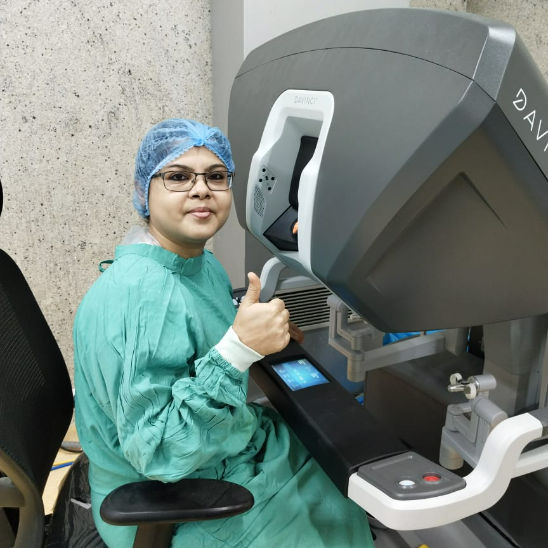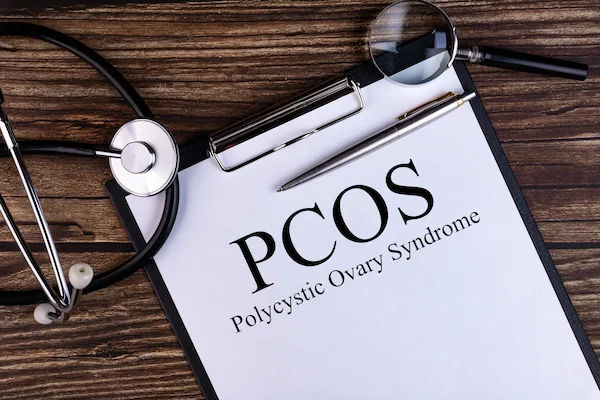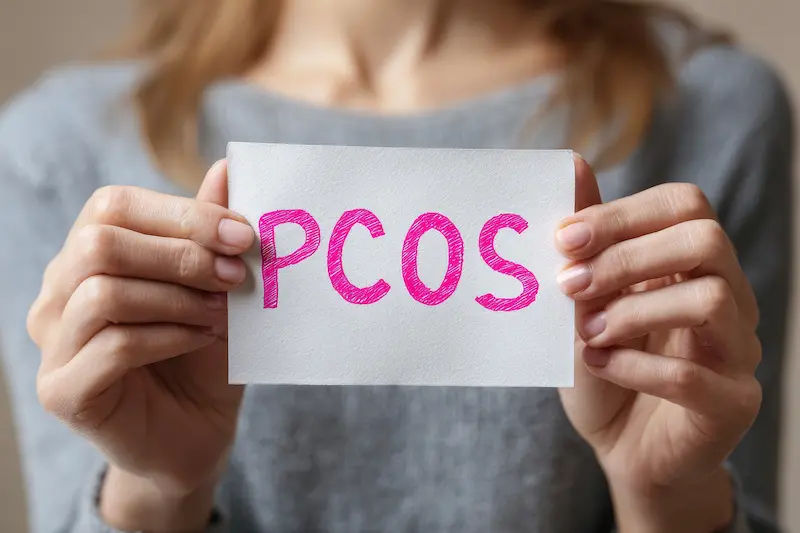PCOS and Its Impact on Pregnancy
Know about PCOS, its relation with fertility, how it affects pregnancy and how it can improve the pregnancy chances. Learn about the management of pregnancy care with PCOS.


Introduction
Polycystic Ovary Syndrome (PCOS) is a common hormonal disorder that affects many women, especially during their reproductive years. If you have PCOS, you might be concerned about how it affects your ability to conceive and have a healthy pregnancy. Right care and lifestyle changes, many women with PCOS can successfully get pregnant and have healthy babies.
In this article, we’ll explore how PCOS impacts pregnancy, what symptoms to watch for, and how you can manage the condition for a smoother journey to motherhood.
Consult a Gynaecologist for Personalised Advice
Understanding PCOS and Its Effects on Fertility
PCOS is a hormonal imbalance where the ovaries produce higher-than-normal levels of androgens (male hormones).
This can lead to:
- Irregular or missed periods
- Multiple small cysts on the ovaries
- Difficulty in ovulation (egg release)
Since ovulation is essential for pregnancy, PCOS can make conception more challenging. However, it does not mean you cannot get pregnant—many women with PCOS conceive naturally or with medical help.
How Does PCOS Affect Pregnancy?
If you have PCOS and become pregnant, you may face certain risks, including:
1. Higher Risk of Miscarriage
- Women with PCOS have a slightly higher chance of miscarriage due to hormonal imbalances and insulin resistance.
2. Gestational Diabetes
- PCOS increases insulin resistance, raising the risk of developing diabetes during pregnancy. This can affect both mother
and baby if not managed properly.
3. High Blood Pressure (Preeclampsia)
- Pregnant women with PCOS are more likely to develop high blood pressure, which can be dangerous if untreated.
4. Preterm Birth
- There’s a higher chance of delivering the baby before 37 weeks.
5. Larger Baby Size (Macrosomia)
- Due to insulin resistance, babies may grow larger than usual, leading to delivery complications.
While these risks sound scary, the good news is that proper medical care and lifestyle adjustments can significantly reduce them.
Tips for Managing PCOS and Improving Pregnancy Chances
1. Maintain a Healthy Weight
- Weight management is crucial because excess weight worsens insulin resistance. Even a 5-10% weight loss can help
regulate periods and improve fertility.
2. Eat a Balanced Diet
It includes:
- Focus on low-glycemic foods (whole grains, vegetables, lean proteins).
- Avoid sugary and processed foods.
- Include healthy fats (avocados, nuts, olive oil).
3. Exercise Regularly
- Moderate exercise (30 minutes a day) helps regulate insulin levels and improve ovulation.
4. Monitor Blood Sugar Levels
- If you have insulin resistance, your doctor may recommend medications like metformin to help manage blood sugar.
5. Track Ovulation
- Use ovulation predictor kits or fertility tracking apps to identify your fertile window.
6. Seek Medical Help if Needed
- If you’ve been trying to conceive for 6-12 months without success, consult a fertility specialist. Treatments like Clomid
(fertility pills) or IVF may help.
Pregnancy Care for Women with PCOS
If you’re pregnant with PCOS, extra precautions can help ensure a healthy pregnancy:
- Regular Prenatal Checkups – Monitor blood sugar, blood pressure, and baby’s growth.
- Healthy Diet & Exercise – Helps control weight and insulin levels.
- Medication (if prescribed) – Some women need insulin-regulating drugs.
- Stress Management – Yoga, meditation, and relaxation techniques help.
When to See a Doctor?
If you have PCOS and are planning pregnancy, it’s best to consult a doctor early. You should also seek help if:
- You have irregular periods and struggle to conceive.
- You experience symptoms like excessive hair growth, acne, or weight gain.
- You’re pregnant and worried about gestational diabetes or high blood pressure.
Final Thoughts
PCOS can make pregnancy more challenging, but it doesn’t mean you can’t have a healthy baby. With the right lifestyle changes, medical support, and early care, many women with PCOS successfully conceive and deliver healthy children.
Consult a Gynaecologist for Personalised Advice
Consult a Gynaecologist for Personalised Advice

Dr. Revathi S Rajan
Obstetrician and Gynaecologist
24 Years • MBBS, DGO, DNB.FFMM
Bengaluru
Apollo Clinic, JP nagar, Bengaluru

Dr. Renuka Chandran
Obstetrician and Gynaecologist
30 Years • MBBS, MD, DGO, Masters in Advanced Ultrasound in Obs & Gynea
Bangalore
Apollo Clinic Bellandur, Bangalore
Dr. B Shravanthi Reddy
Radiation Specialist Oncologist
8 Years • MBBS, DNB(Radiation Oncology)
Manikonda Jagir
Apollo Clinic, Manikonda, Manikonda Jagir
Rashmi Reddy
Obstetrician and Gynaecologist
2 Years • MBBS,MS(OBST & GYNAE)
Bengaluru
Apollo Clinic, Electronic City, Bengaluru

Dr. Rupashree Dasgupta. Gynaecological Oncology
Gynaecological Oncology & Robotic Surgery
26 Years • MD(Gold Medalist, CMC Vellore), DGO(Gold Medalist, CMC Vellore),DNB, MRCOG(London), MBBS(FOGSI Gold Medalist in Gynaecology).Specialist in Advanced Laparoscopic & Robotic Surgery, UICC Fellowship in Gynae Oncosurgery(BARTS Cancer Institute, LONDON), da Vinci certified training as ROBOTIC CONSOLE Surgeon(USA), Fellowship Gynae Oncosurgery(TMC, Kolkata)
Kolkata
Apollo Multispeciality Hospitals , Kolkata, Kolkata
(375+ Patients)
Consult a Gynaecologist for Personalised Advice

Dr. Revathi S Rajan
Obstetrician and Gynaecologist
24 Years • MBBS, DGO, DNB.FFMM
Bengaluru
Apollo Clinic, JP nagar, Bengaluru

Dr. Renuka Chandran
Obstetrician and Gynaecologist
30 Years • MBBS, MD, DGO, Masters in Advanced Ultrasound in Obs & Gynea
Bangalore
Apollo Clinic Bellandur, Bangalore
Dr. B Shravanthi Reddy
Radiation Specialist Oncologist
8 Years • MBBS, DNB(Radiation Oncology)
Manikonda Jagir
Apollo Clinic, Manikonda, Manikonda Jagir
Rashmi Reddy
Obstetrician and Gynaecologist
2 Years • MBBS,MS(OBST & GYNAE)
Bengaluru
Apollo Clinic, Electronic City, Bengaluru

Dr. Rupashree Dasgupta. Gynaecological Oncology
Gynaecological Oncology & Robotic Surgery
26 Years • MD(Gold Medalist, CMC Vellore), DGO(Gold Medalist, CMC Vellore),DNB, MRCOG(London), MBBS(FOGSI Gold Medalist in Gynaecology).Specialist in Advanced Laparoscopic & Robotic Surgery, UICC Fellowship in Gynae Oncosurgery(BARTS Cancer Institute, LONDON), da Vinci certified training as ROBOTIC CONSOLE Surgeon(USA), Fellowship Gynae Oncosurgery(TMC, Kolkata)
Kolkata
Apollo Multispeciality Hospitals , Kolkata, Kolkata
(375+ Patients)
.webp)



